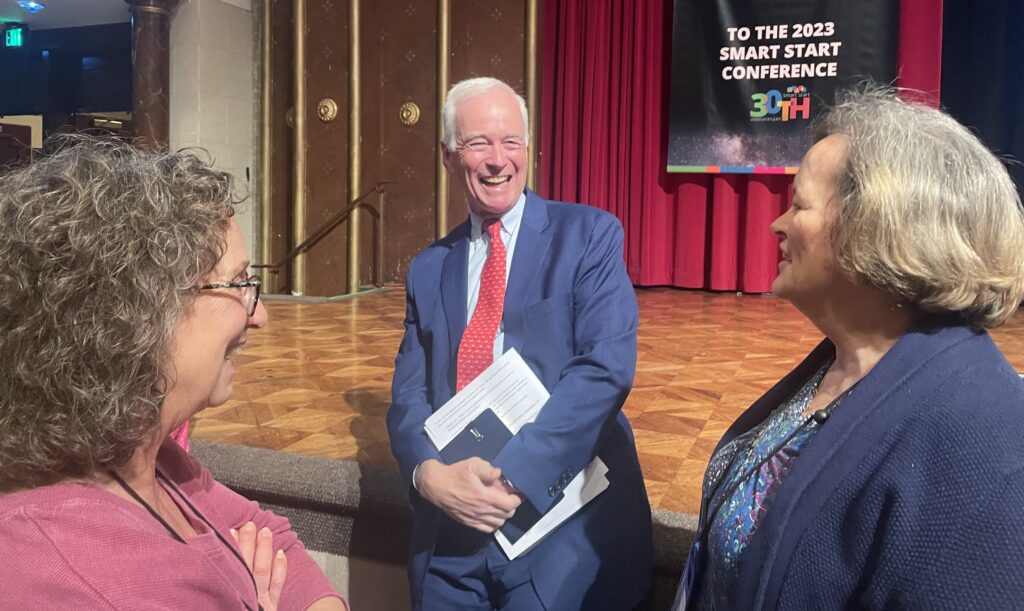'A much more difficult environment for child care'

board chair of the North Carolina Partnership for Children; and Genevieve Megginson, executive director of Chatham Partnership for Children. Liz Bell/EducationNC
Katie and I were at conferences last week learning about early childhood initiatives in North Carolina and beyond. In Greensboro, I spent time at Smart Start’s national conference as the network celebrated its 30-year anniversary. I learned about Japan’s child care challenges and children’s cafeterias, early childhood apprenticeships across the state, and leaders in Southeastern North Carolina teaching community members about coping with adverse childhood experiences. Thank you for having me.
Katie was in Chapel Hill at the T.E.A.C.H. Early Childhood National Center’s workforce convening learning about funding initiatives in other states, and policy strategies for improving accessibility, affordability, and quality — all of which is dependent on providing family-sustaining wages and benefits to the early childhood workforce.
EdNC has told many early childhood stories in the last couple years, but an overarching thread connects many of them: early care and education is headed towards a fiscal cliff at the end of this year.
This is not unique to North Carolina. Without federal action to address the ending of pandemic stabilization funds, states are having to confront child care spacing and staffing shortages — and their impacts on families and businesses.
A new survey I wrote about provides a peek into how North Carolina child care programs (both centers and home-based programs) used the compensation grants (a portion of the federal funds the state encouraged programs to use for wage increases, bonuses, and benefits), and how the absence of those funds could impact programs’ abilities to serve children and families’ abilities to find and afford care.
Most providers said they either would not be able to maintain increased staff wages or weren’t sure they would. The most likely impact of the funds’ end, respondents said, was difficulty finding teachers with comparable levels of education and experience.
Without continued funding, respondents said, they’ll almost certainly have to increase parent tuition rates — rating the likelihood at an average of 3.91 on a scale of 1 to 5.
“When these funds end, and if these funds are not replaced, we think it’s going to be a much more difficult environment for child care, which means it’ll be a more difficult environment for all those families who rely on affordable, quality child care,” said Janet Singerman, president and CEO of Child Care Resources, Inc.
The state House’s budget did not include funds to continue stabilization. Go here to read the full story on what the survey results mean as the state legislative session continues. Go here for our coverage last month of child care advocates’ rally at the General Assembly, during which they pushed for lawmakers to double the state’s early childhood investment.
And below, don’t miss the Bertie story HEREY, or an expert webinar on navigating challenging classroom behaviors.
Early Bird reads: What we’re writing
Without additional funding, child care costs are likely to rise, providers say in survey
Results of a new survey of child care providers by the North Carolina Child Care Resource & Referral (NC CCR&R) Council offer context on the difference federal funds made for early childhood educators — and what the end of those funds might mean for children, families, teachers, and businesses.
Your take, for goodness sake: EdNC perspectives
Perspective | Literacy for life: It starts at birth
Ginger Young, founder and CEO of Book Harvest, highlights the progress the state has made when it comes to its focus on improving children’s literacy in pre-K and early elementary grades.
“This flurry of attention to children’s literacy is encouraging and even exciting; but it fails to acknowledge and act on one driving truth: Literacy begins at birth,” Young writes.
“Only if and until all of us — parents, educators, policymakers, health care providers, business leaders, and passionate advocates — work together to bring the true starting line of literacy to birth will we realize enduring, vibrant literacy for all children.”
In other early learning news: What I’m reading
Smart Start continues to focus on improving local child care - From The Transylvania Times
Biden’s new executive order could expand access to child care and long-term care - From The 19th News
Website offers SC parents single application for dozens of early childhood services - From The Post and Courier
North Dakota lawmakers pass $66 million package to address child care cost, availability - From The Bismark Tribune
With emergency funding drying up, child care is once again on the precipice - From The Hechinger Report
Research & Resources: Let's talk responding to biting, what to do as health emergency ends
The North Carolina Research & Referral Council is hosting a free webinar on May 11 from 7 to 8 pm with Healthy Social Behaviors Helpline advisors on why children bite and best practices on how to respond. You can access the Zoom meeting here.
This week (May 11) marks the end of the federal public health emergency. The state Department of Health and Human Services released fliers in English and Spanish on steps for individuals participating in the Medicaid, FNS, and WIC programs should take to stay up to date on their benefits.
Sign up for Early Bird, our newsletter on all things early childhood.


